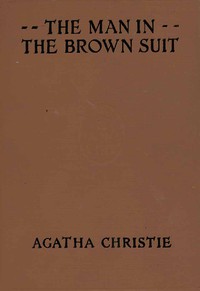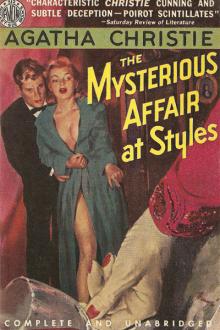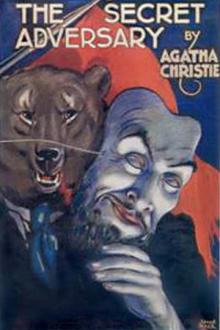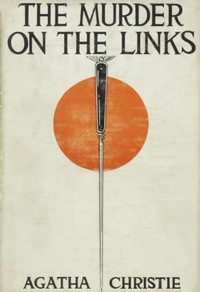The Man in the Brown Suit by Agatha Christie (ebook reader browser .TXT) 📗

- Author: Agatha Christie
Book online «The Man in the Brown Suit by Agatha Christie (ebook reader browser .TXT) 📗». Author Agatha Christie
Things that one would shrink from attempting normally are easily tackled in a flush of anger. Without giving myself time to reflect, I walked straight to the house of Lord Nasby.
Lord Nasby was the millionaire owner of the Daily Budget. He owned other papers—several of them, but the Daily Budget was his special child. It was as the owner of the Daily Budget that he was known to every householder in the United Kingdom. Owing to the fact that an itinerary of the great man’s daily proceedings had just been published, I knew exactly where to find him at this moment. It was his hour for dictating to his secretary in his own house.
I did not, of course, suppose that any young woman who chose to come and ask for him would be at once admitted to the august presence. But I had attended to that side of the matter. In the card-tray in the hall of the Flemmings’ house I had observed the card of the Marquis of Loamsley, England’s most famous sporting peer. I had removed the card, cleaned it carefully with bread-crumbs, and pencilled upon it the words: “Please give Miss Beddingfeld a few moments of your time.” Adventuresses must not be too scrupulous in their methods.
The thing worked. A powdered footman received the card and bore it away. Presently a pale secretary appeared. I fenced with him successfully. He retired defeated. He again reappeared and begged me to follow him. I did so. I entered a large room, a frightened-looking shorthand-typist fled past me like a visitant from the spirit-world. Then the door shut and I was face to face with Lord Nasby.
A big man. Big head. Big face. Big moustache. Big stomach. I pulled myself together. I had not come here to comment on Lord Nasby’s stomach. He was already roaring at me.
“Well, what is it? What does Loamsley want? You his secretary? What’s it all about?”
“To begin with,” I said with as great an appearance of coolness as I could manage, “I don’t know Lord Loamsley, and he certainly knows nothing about me. I took his card from the tray in the house of the people I’m staying with, and I wrote those words on it myself. It was important that I should see you.”
For a moment it appeared to be a toss up as to whether Lord Nasby had apoplexy or not. In the end, he swallowed twice and got over it.
“I admire your coolness, young woman. Well, you see me! If you interest me, you will continue to see me for exactly two minutes longer.”
“That will be ample,” I replied. “And I shall interest you. It’s the Mill House Mystery.”
“If you’ve found ‘The Man in the Brown Suit,’ write to the Editor,” he interrupted hastily.
“If you will interrupt, I shall be more than two minutes,” I said sternly. “I haven’t found ‘The Man in the Brown Suit,’ but I’m quite likely to do so.”
In as few words as possible I put the facts of the Tube accident and the conclusions I had drawn from them before him. When I had finished he said unexpectedly:
“What do you know of brachycephalic heads?”
I mentioned Papa.
“The Monkey man? Eh? Well, you seem to have a head of some kind upon your own shoulders, young woman. But it’s all pretty thin, you know. Not much to go upon. And no use to us—as it stands.”
“I’m perfectly aware of that.”
“What d’you want, then?”
“I want a job on your paper to investigate this matter.”
“Can’t do that. We’ve got our own special man on it.”
“And I’ve got my own special knowledge.”
“What you’ve just told me, eh?”
“Oh, no, Lord Nasby. I’ve still got something up my sleeve.”
“Oh, you have, have you? You seem a bright sort of girl. Well, what is it?”
“When this so-called doctor got into the lift, he dropped a piece of paper. I picked it up. It smelt of moth balls. So did the dead man. The doctor didn’t. So I saw at once that the doctor must have taken it off the body. It had two words written on it and some figures.”
“Let’s see it.”
Lord Nasby stretched out a careless hand.
“I think not,” I said, smiling. “It’s my find, you see.”
“I’m right. You are a bright girl. Quite right to hang on to it. No scruples about not handing it over to the police?”
“I went there to do so this morning. They persisted in regarding the whole thing as having nothing to do with the Marlow affair, so I thought that in the circumstances I was justified in retaining the paper. Besides, the inspector put my back up.”
“Short-sighted man. Well, my dear girl, here’s all I can do for you. Go on working on this line of yours. If you get anything—anything that’s publishable—send it along and you shall have your chance. There’s always room for real talent on the Daily Budget. But you’ve got to make good first. See?”
I thanked him, and apologized for my methods.
“Don’t mention it. I rather like cheek—from a pretty girl. By the way, you said two minutes and you’ve been three, allowing for interruptions. For a woman, that’s quite remarkable! Must be your scientific training.”
I was in the street again, breathing hard as though I had been running. I found Lord Nasby rather wearing as a new acquaintance.
I went home with a feeling of exultation. My scheme had succeeded far better than I could possibly have hoped. Lord Nasby had been positively genial. It only now remained for me to “Make good,” as he expressed it. Once locked in my own room, I took out my precious piece of paper and studied it attentively. Here was the clue to the mystery.
To begin with, what did the figures represent? There were five of them, and a dot after the first two. “Seventeen—one hundred and twenty-two,” I murmured.
That did not seem to lead to anything.
Next I added them up. That is often done in works of fiction and leads to surprising deductions.
“One and seven make eight and one is nine and two are eleven and two are thirteen.”
Thirteen! Fateful number! Was this a warning to me to leave the whole thing alone? Very possibly. Anyway, except as a warning, it seemed to be singularly useless. I declined to believe that any conspirator would take that way of writing thirteen in real life. If he meant thirteen, he would write thirteen. “13”—like that.
There was a space between the one and the two. I accordingly subtracted twenty-two from a hundred and seventy-one. The result was a hundred and fifty-nine. I did it again and made it a hundred and forty-nine. These arithmetical exercises were doubtless excellent practice, but as regarded the solution of the mystery, they seemed totally ineffectual. I left arithmetic alone, not attempting fancy division or multiplication, and went on to the words.
Kilmorden Castle. That was something definite. A place. Probably the cradle of an aristocratic family. (Missing heir? Claimant to title?) Or possibly a picturesque ruin. (Buried treasure?)
Yes, on the whole I inclined to the theory of buried treasure. Figures always go with buried treasure. One pace to the right, seven paces to the left, dig one foot, descend twenty-two steps. That sort of idea. I could work out that later. The thing was to get to Kilmorden Castle as quickly as possible.
I made a strategic sally from my room and returned laden with books of reference. Who’s Who, Whitaker, a Gazetteer, a History of Scotch Ancestral Homes, and Somebody or other’s British Isles.
Time passed. I searched diligently, but with growing annoyance. Finally, I shut the last book with a bang. There appeared to be no such place as Kilmorden Castle. Here was an unexpected check. There must be such a place. Why should any one invent a name like that and write it down on a piece of paper? Absurd!
Another idea occurred to me. Possibly it was a castellated abomination in the suburbs with a high-sounding name invented by its owner. But if so, it was going to be extraordinarily hard to find. I sat back gloomily on my heels (I always sit on the floor to do anything really important) and wondered how on earth I was to set about it.
Was there any other line I could follow? I reflected earnestly and then sprang to my feet delightedly. Of course! I must visit the “scene of the crime.” Always done by the best sleuths! And no matter how long afterwards it may be, they always find something that the police have overlooked. My course was clear. I must go to Marlow.
But how was I to get into the house? I discarded several adventurous methods, and plumped for stern simplicity. The house had been to let—presumably was still to let. I would be a prospective tenant.
I also decided on attacking the local house-agents, as having fewer houses on their books.
Here, however, I reckoned without my host. A pleasant clerk produced particulars of about half a dozen desirable properties. It took all my ingenuity to find objections to them. In the end I feared I had drawn a blank.
“And you’ve really nothing else?” I asked, gazing pathetically into the clerk’s eyes. “Something right on the river, and with a fair amount of garden and a small lodge,” I added, summing up the main points of the Mill House, as I had gathered them from the papers.
“Well, of course there’s Sir Eustace Pedler’s place,” said the man doubtfully. “The Mill House, you know.”
“Not—not where——” I faltered. (Really, faltering is getting to be my strong point.)
“That’s it! Where the murder took place. But perhaps you wouldn’t like——”
“Oh, I don’t think I should mind,” I said with an appearance of rallying. I felt my bona fides was now quite established. “And perhaps I might get it cheap—in the circumstances.”
A master touch that, I thought.
“Well, it’s possible. There’s no pretending that it will be easy to let now—servants and all that, you know. If you like the place after you’ve seen it, I should advise you to make an offer. Shall I write you out an order?”
“If you please.”
A quarter of an hour later I was at the lodge of the Mill House. In answer to my knock, the door flew open and a tall middle-aged woman literally bounced out.
“Nobody can go into the house, do you hear that? Fairly sick of you reporters, I am. Sir Eustace’s orders are——”
“I understood the house was to let,” I said freezingly, holding out my order. “Of course, if it’s already taken——”
“Oh, I’m sure I beg your pardon, miss. I’ve been fairly pestered with these newspaper people. Not a minute’s peace. No, the house isn’t let—nor likely to be now.”
“Are the drains wrong?” I asked in an anxious whisper.
“Oh, Lord, miss, the drains is all right! But surely you’ve heard about that foreign lady as was done to death here?”
“I believe I did read something about it in the papers,” I said carelessly.
My indifference piqued the good woman. If I had betrayed any interest, she would probably have closed up like an oyster. As it was, she positively bridled.
“I should say you did, miss! It’s been in all the newspapers. The Daily Budget’s out still to catch the man who did it. It seems, according to them, as our police are no good at all. Well, I hope they’ll get him—although a nice-looking young fellow he was and no mistake. A kind of soldierly look about him—ah, well, I dare say he’d been wounded in the war, and sometimes they go a bit queer afterwards, my sister’s boy did. Perhaps she’d used him bad—they’re a bad lot, those foreigners. Though she was a fine-looking woman. Stood there where you’re standing now.”
“Was she dark or fair?” I ventured. “You can’t tell from these newspaper portraits.”
“Dark hair, and a very white face—too white for nature, I thought, and her lips reddened something cruel. I don’t like to see it—a little powder now and then is quite another thing.”
We were conversing like old friends now. I put another question.
“Did she seem nervous or upset at all?”
“Not a bit. She was smiling to herself, quiet like, as though she was amused at something. That’s why you could have knocked me down with a feather when, the next afternoon, those people came running out calling for the police and saying there’d been murder done. I shall never get over it, and as for setting foot in that house after dark I wouldn’t do it, not if it was ever so. Why, I wouldn’t even stay here at the lodge, if Sir Eustace hadn’t been down on his bended knees to me.”
“I thought Sir Eustace Pedler was at Cannes?”
“So he was, miss. He come back to England when he heard the news, and, as to the bended knees, that





Comments (0)